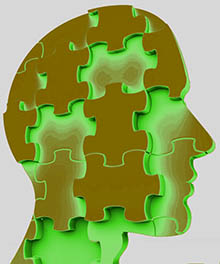Forgetting to remember
What is it that  makes us who we are?
makes us who we are?
It’s often argued that the self is socially constructed, developed through the interconnectedness of the various aspects of the society in which we function. More specifically, the self could be seen as a complicated jigsaw puzzle of how we’re parented, our schooling, our social interaction with family and friends, and all our other life experiences.
But what happens if pieces of the puzzle that’s been created start to disappear? Are we still ourselves if we forget some of the bits that make us who we are?
What’s brought this to mind is my dear friend Mil. For a while she’s been getting more and more forgetful. But until fairly recently she just found it an inconvenience, something that could be considered an inevitable consequence of ageing. It was mostly variations on a theme of oh-dear-where-have-I put-xxx and not a cause for undue concern, she thought, considering that we all do that sort of thing sometimes.
Then suddenly great big gaps in her memory started to appear, seemingly overnight. The gaps seem random – her birthday party a couple of months ago, visitors from overseas last year, a tragic death in the family a few years before that, her youngest son and his family coming to stay last Xmas and a number of short-term gaps as well. Most worrying is that, despite visits to the hospital, consulting a neurologist and all manner of tests and scans, there appears to be no specific or discernible reason for it. So there’s no clear diagnosis, just a great deal of confusion and worry.
Talking to her, I’ve realised that Mil feels as though she could wake up on any given morning and another little chunk of what makes her herself might be gone. Another memory – big or small – could have disappeared and, until told otherwise by family or friends, it will be as though the event never happened.
More frightening than the actual memory loss, she says, is the randomness of it all. For someone accustomed to being in control of her life, to planning events and taking an active interest in the world around her, who values logic very highly, this is a very scary place for Mil to find herself.
No matter how much I think about the situation or read up on memory loss, I find that I end up with more questions than answers. What does one do when events, days and years start to fizzle and disappear?
Standard advice seems to be to plan ahead once a diagnosis is obtained. This includes legal, financial and health planning. But the path to diagnosis, to discovering choices and to possible treatment seems to take so very long.
Starting to keep a journal seems to have helped. Mil’s found that simply making a note of things as they happen or writing down how she’s feeling on any given day provides her with reference points. When she pages back, even if she’s forgotten the events, she feels she can trust the words on the pages. She can see that she’s written them, even if she can’t remember having done so, and that distinction makes a big difference to her.
I find that this puts my years of intermittent journaling into a new perspective for me. Perhaps I’ve always been writing for a future me, providing myself with trustworthy breadcrumbs back to a past I’ll very possibly forget one day.
Perhaps it’s something we could all consider doing. That, and making sure that every year we have is as good a year as we can make it.